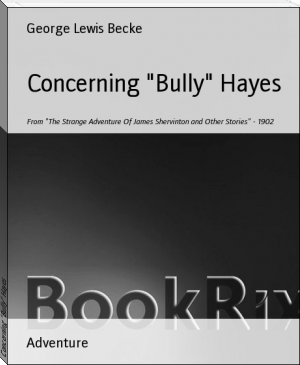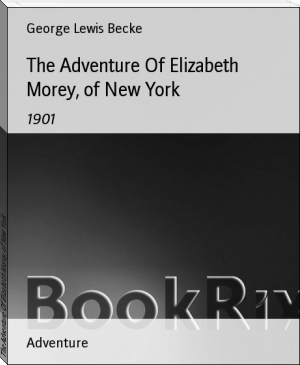Ridan The Devil And Other Stories - George Lewis Becke (free ebooks for android txt) 📗

- Author: George Lewis Becke
Book online «Ridan The Devil And Other Stories - George Lewis Becke (free ebooks for android txt) 📗». Author George Lewis Becke
'Charles,' said my mother, who was now herself again, 'it must _not_ blow over. The Governor shall know of this man's doings. And never again shall I or my children enter the church when he preaches. To-night, I suppose, he will visit that wretched old man--the victim of his brutality--and administer "spiritual admonition." Come, children, let us go to the beach and forget that that dreadful man has been here.'
It was, I think, this practice of 'administering admonition' to convicts after he had had them sentenced to a severe flogging that first gave my mother such an utter abhorrence of the man, together with his habit of confining his sermons to the prisoners to the one subject--their own criminal natures and the terrors of hell-fire everlasting. Then, too, his voice was appalling to hear, for he had a way of suddenly dropping his harsh, metallic tones, and raising his voice to a howl, like to that of a hungry dingo.{*}
* The native dog of Australia, whose long, accentuated howl
is most distressing to hear.
Often did I, when sitting in our great square pew in that dreadful, horrible church, press close to my mother's side and bury my face in her dress, as he lashed himself into a fury and called down the vengeance of a wrathful God upon the rows of silent, wretched beings clad in yellow, who were seated on long stools in the back of the church, guarded by soldiers, who, with loaded muskets, were stationed in the gallery above. Some of the convicts, it was said, had sworn to murder him if an opportunity served, and this no doubt made him the more merciless and vindictive to any one of them who was so unfortunate as to be charged before him in his capacity of magistrate. By the Regulations he could not sit alone to deal out punishment, and sometimes had difficulty in finding a colleague, especially among the military men, who nearly always protested against his fondness for the cat; but there were always to be found, in the end, magistrates who would do anything to please him, for it was known that he had great influence with the Home Government, and was not chary of using it on behalf of those who truckled to him, if he so inclined; and, indeed, both Major Trenton and Dr Parsons said that he was a man with many good points, and could be, to those who pleased him, a good friend, as well as a bitter enemy to those who in any way crossed him. But they asserted that he should never have been appointed a magistrate in a colony where the penal laws gave such latitude to his violent temper and arbitrary disposition.
Early one morning in December, and three months after the drawing of the picture by Lieutenant Moore, my two brothers and myself set off on a fishing excursion to a tidal lagoon whose waters debouched into the Pacific, about fifteen miles southward from the little township. Behind us followed a young man named Walter Trenfield, who was one of my father's assigned servants, and an aboriginal named 'King Billy'; these two carried our provisions, cooking utensils and blankets, for we intended to camp out for two or three days.
A half-an-hour's walk over the slopes of the bluff brought us to the fringe of the dense coastal forest, through which our track lay for another two or three miles before we again came to open country. There was, however, a very good road, made by convict labour, through the scrub as far as it went; it ran almost along the very verge of the steep-to coast, and as we tramped over the rich red soil we had the bright blue sea beneath us on our left, and the dark and almost silent bush on our right. I say 'almost,' for although in these moist and sunless seaboard tracts of what we Australian-born people call bush, and English people would call wood or forest, there was no sound of human life, there was yet always to be heard the _thump, thump_ of the frightened scrub wallaby, and now and again the harsh, shrieking note of the great white cockatoo, or the quick rush of a long-tailed iguana over the thick bed of leaves, as the timid reptile fled to the nearest tree, up whose rugged bole it crawled for security.
We had come some three or four miles upon our way, when we suddenly emerged from the darkness and stillness of the scrub out into the light of day and the bright sunshine, and heard the low murmur of the surf beating upon the rocks below. Here we sat down to rest awhile and feast our boyish eyes on the beauties of sea and shore and sky around us. A few hundred yards away from where we sat was a round, verdured cone called 'Little Nobby'; it rose steep-to from the sea to a height of about three hundred feet, and formed a very striking and distinct landmark upon that part of the coast--bold and rugged as it was--for a stretch of three score miles. Presently, as we lay upon the grass, looking out upon the sea, Walter Trenfield and the aboriginal joined us, and whilst they made a fire to boil a billy of tea, my brother Harry, hearing the call of a wonga pigeon, picked up his gun and went into the scrub to shoot it.
CHAPTER II
I must now relate something of the previous history of this young man Trenfield. He was a native of Bideford, in Devon--my mother's county--and had been a sailor. Some years before, he, with another young man named Thomas May, had been concerned in a mutiny on board a London whale-ship, the _Jason_, and both men were sentenced to fourteen years' penal servitude, it being believed, though not proven, that either Trenfield or May had killed one of the officers with a blow of the fist. They were, with six of their shipmates, tried at the Old Bailey, and although a Quaker gentleman, a Mr Robert Bent, who had visited them in prison, gave a lawyer fifty guineas to defend them, the judge said that although the death of the officer could not be sheeted home to either of them, there was no doubt of their taking part in the mutiny--with which offence they were charged. After spending three months in one of the convict hulks they were sent out to Sydney in the _Breckenbridge_ transport. But before they sailed they were several times visited by Mr Bent, who told them that he would always bear them in mind, and should endeavour to have their sentences reduced if he heard good word of their future conduct from his agent in Sydney; this Mr Bent was the owner of several of the Government transports, which, after discharging their cargo of convicts, would sail upon a whaling cruise to the South Seas. More than this, he said that he would give them berths on one of his vessels as soon as they regained their freedom, and that he had written to his agent to that effect.
It so happened that this agent, a Mr Thomas Campbell, was a friend of my father's, who also knew Mr Bent, and so when the _Breckenbridge_ arrived at Sydney he succeeded in having Trenfield assigned to him, and Thomas May to a contractor who was building a bridge for the Government over a river in the vicinity of Bar Harbour.
The two young seamen were very much attached to each other, and their cheerful dispositions, good conduct and unceasing industry led to their being granted many privileges. Both my father and my mother had taken a strong liking to Trenfield; and so, too, had Ruth Kenna, a young free female servant of ours. As for we boys, we simply worshipped both Trenfield and May as heroes who had sailed in the far South Seas and harpooned and killed the mighty sperm whale, and had fought with the wild and naked savages of the Pacific Isles.
Ruth Kenna was the daughter of a small farmer in the district, who had been emancipated by the good Governor. He was a widower, and a rough, taciturn man, but passionately devoted to Ruth, who was his only child. He had been transported for having taken part in the disastrous Irish rebellion of '98,' and his young wife had followed him to share his exile. The terrors and hardships of the long voyage out killed her, for she died almost as soon as she landed, without seeing her husband, and leaving her infant child to the kindly care of the officers of the detachment of the regiment which had come out in the same ship. By them the infant girl had been placed in the charge of a respectable female convict, who, at my mother's expense, had kept her till she was ten years of age. Then she came to us as a servant, and had remained ever since.
Very often my father--though he pretended, as became his official position in a Crown Colony, to have a great dislike to Irish Roman Catholics--would allow we boys to go to Patrick Kenna's farm to shoot native bears and opossums, which were very plentiful thereabout, for the land was very thickly timbered with blue gum, tallow-wood and native apple. The house itself stood on the margin of a small tidal creek, whose shallow waters teemed with fish of all descriptions, and in the winter Kenna would catch great numbers of whiting, bream and sea mullet, which he salted and dried and sold to the settlers who lived inland. He lived quite alone, except from Saturday morning till Sunday morning, when Ruth stayed with him and straightened up the rough house. Sometimes Ruth would persuade my mother to let my brother Will and myself stay with them for the night, and dearly did we love going; for her father, though a silent, cold-mannered man to most people, was always different to any one of us Egertons, and never even grumbled when we got into mischief, though he pretended to be very angry. Once, indeed, he had good cause to be--as I shall relate.
One Saturday evening, after we had finished our supper, Patrick Kenna found that he had run out of tobacco, and said that if we were not afraid of being left by ourselves for a few hours he would walk into Bar Harbour and buy some before the store closed, returning before midnight. Of course we did not mind, and in a few minutes Ruth's father set out, accompanied by 'King Billy' and one or two other black-fellows who were in hopes of selling some wild honey for a bottle or two of rum. We watched them disappear into the darkness of the forest, and then, as the night was suitable, my brother Will proposed that we should all go down to the creek and fish for black bream.
'The tide is coming in, Ruth,' he said gleefully, 'and we'll have fine sport. I'll go on first and light a fire on the bank.'
Presently, as Ruth and I were getting ready our lines, he dashed into the house again, panting with excitement.
'Never mind the lines. Oh, I have glorious news! The salmon are coming in, in swarms, and the water is alive with them! Ruth, let us get the net and put it right across the creek as soon as it is slack water. 'Twill be glorious.'
Now, we knew that the sea salmon had been seen out at sea a few days before, but it was yet thought to be too soon for their





Comments (0)